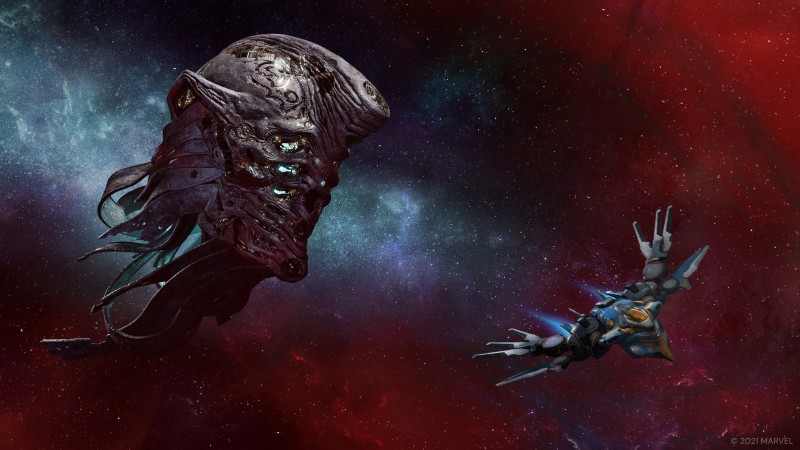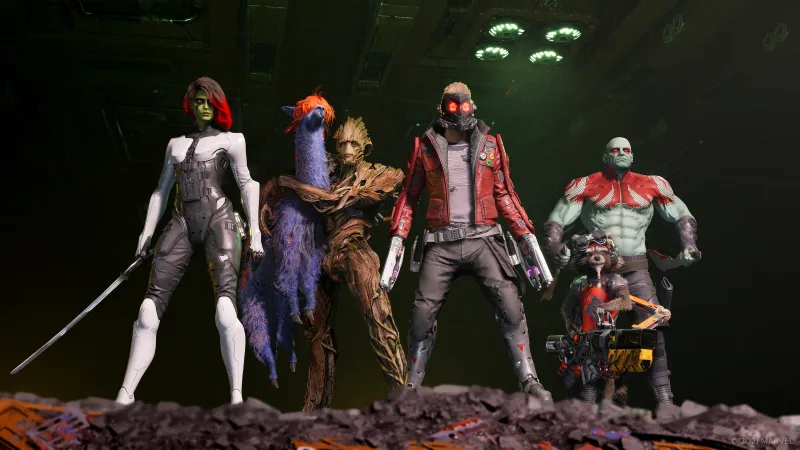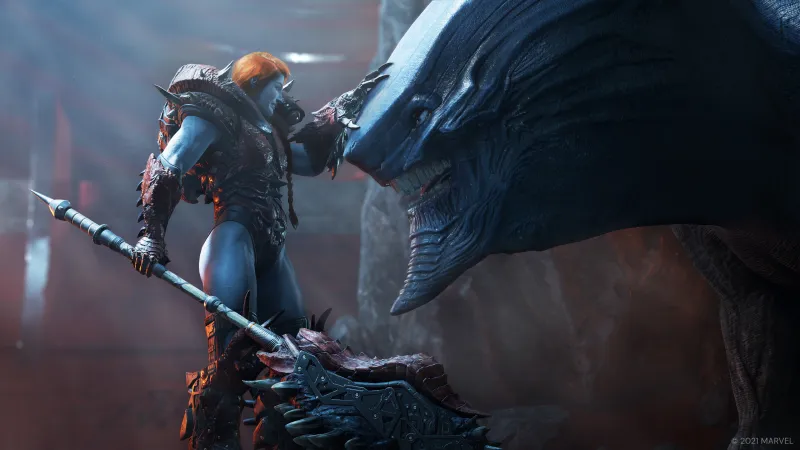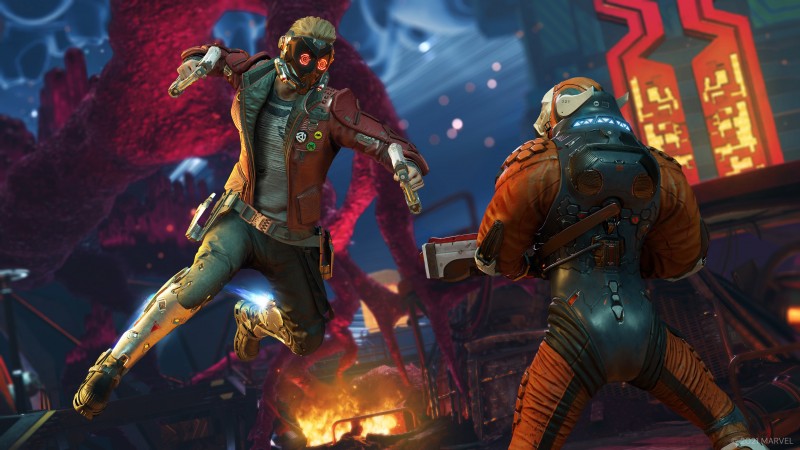
When Marvel's Guardians of the Galaxy was revealed by Eidos-Montréal and Square Enix in June, the trailer made it clear the development team was forging its own path with the story, character design, and gameplay. However, certain elements of the tone many fans know and love from the Marvel Cinematic Universe films are present, including the action, humor, and, perhaps most importantly, the way licensed music from the past permeates the experience.
As players blast their way through the cosmos, they can expect to hear a fully orchestrated soundtrack. The recording happened at the famed Abbey Road Studios in London, England, with inspiration drawn from John Williams' scores in the Star Wars movies. The notion was to create an accompaniment akin to what you'd hear in a popcorn-style action/adventure movie.
While every track we heard during our gameplay demo was fitting for the action on screen, the licensed tracks are simultaneously show-stealing attention grabbers and perfect complements to the action. Senior audio director Steve Szczepkowski was largely responsible for the licensed tracks appearing in the game. Just as Peter Quill (AKA Star-Lord) makes his own mixtapes in the Marvel Universe, Szczepkowski was essentially able to do the same for Marvel's Guardians of the Galaxy – with a few caveats.

"As much as it was fun, it was actually quite challenging to try and limit myself to only a set amount of songs and be like, 'Which are the right songs?'" he says. "Even then, just because I want the song doesn't mean there's going to be a fit for the artist for whatever reason; they might not want to be involved in any games or they might not want to license their stuff, so there was a lot of factors into that."
Unlike the MCU films, where Peter is constantly popping in cassette tapes featuring the biggest hits of the 1970s, in Marvel's Guardians of the Galaxy, his musical taste skews more towards the big hits of the '80s. "One of the mandates we were asked by Marvel was to make it a unique standalone experience," Szczepkowski says. "What we did right away is decided to go, 'What if Peter grew up in the '80s?' Here's a decade that's rich and it's a lot more familiar for our audience than the '70s. It's a bit closer. The licensed music, and everything you're going to experience for that in the game is definitely wrapped up in the '80s."
The process Szczepkowski used for selecting the music that appears in the game, which ranges from Iron Maiden to Rick Astley, was bouncing ideas off of senior creative director Jean-François Dugas. Dugas veers more into the heavy metal acts from the '80s, where as Szczepkowski was raised on a steady diet of hard rock and new wave. While Szczepkowski acknowledges that he could have very easily thrown together a playlist of his favorite rock groups from the '80s in a few minutes, he understands the need for mass appeal.

"Without revealing too much, I even went after one or two earworms – those songs that when you would hear on the radio would stick in your head for three hours after and you'd catch yourself thinking it and want to punch yourself in the head for whatever reason. You're like, 'Why am I singing this song?'"
While much of the musical implementation (both licensed and orchestrated) is done organically, Szczepkowski alluded that there's one scene in particular where they designed the scene around the payoff of the song kicking in. Szczepkowski worked closely with the team to build properly to that moment so that when the track starts, it's earned and not jarring.
In certain instances like that one, the right licensed song can make or break a scene, and when Szczepkowski knows the song is the right fit, he fights for its inclusion. "It's a gut instinct," he says. "I sit down and I'll try like 20 different tracks, and all of a sudden one track just rings for me, and regardless of what anybody else says, I know from my experience that's the right track in that moment and I'm ready to fall on my sword one way or another for it."

Szczepkowski took on a proactive role in the implementation of licensed tracks, often going to other members of the team, like Dugas, and suggesting inserting particular licensed tracks into scenes. Prior to the COVID-19 pandemic forcing everyone to work remotely, Szczepkowski's desk was next to that of animation director Darryl Purdy. The two would constantly volley ideas back and forth about which scenes should have licensed tracks, how they implement them, and which track would fit best.
"I can't talk about it now, but there's a moment in our game where we triggered a licensed track for a certain moment, and for me, it's my favorite part of the game," Purdy says. "It was the first one that we collaborated on and when we got it, we were like 'Oh, yeah, okay. We've nailed the tone of what we want!'"
Perhaps the most in-your-face way licensed music is used is in special huddle sequences during combat encounters. In one instance in the gameplay shown during the game's reveal, Star-Lord initiates a huddle during a difficult battle, which boosts his fellow Guardians as a popular song blares over the combat. In the instance shown in the reveal gameplay footage, Joan Jett's "Bad Reputation" was Star-Lord's track of choice. While the song that plays during these supercharged combat sequences changes, the concept is the same.
Click here to watch embedded media"That basically came about from me seeing some artwork from one of the concept artists that had the Guardians in almost like a football-style huddle from in combat," Szczepkowski says. "I thought, 'Wow, that's really interesting' and he was telling me his concept. Then I went back and was like, 'What if one of these things is a power up and what if we tried playing licensed music over the combat, but not all the time, obviously, because anything that's cool, you overdo it, and it stops being cool really fast."
The team settled on having the huddle mechanic be almost a reward and celebration of sorts for players. The huddle concept layers on top of the core combat to create extra special sequences featuring massive hits that inject an extra punch to encounters. Moments like that exemplify exactly the kind of musical DNA that is intertwined with the foundation of Guardians of the Galaxy at this point.
As those who have streamed or posted playthroughs of games that use licensed music can attest, recognizable tracks not created for the sole purpose of the video game they're featured in can be a nightmare of DMCA strikes. Thankfully, Marvel's Guardians of the Galaxy includes a Streaming Mode, which disables all licensed music and allows for streamers to broadcast and archive their streams worry-free.
Marvel's Guardians of the Galaxy launches on PlayStation 5, Xbox Series X, PlayStation 4, Xbox One, Switch (via the cloud), and PC on October 26. For more on this upcoming title from Eidos-Montréal and Square Enix, be sure to click on the image below to head to our coverage hub!
No comments:
Post a Comment